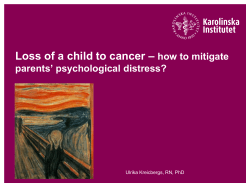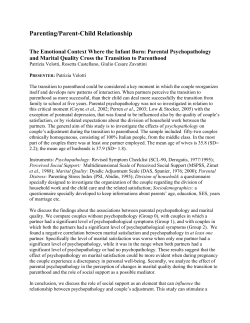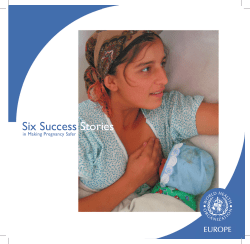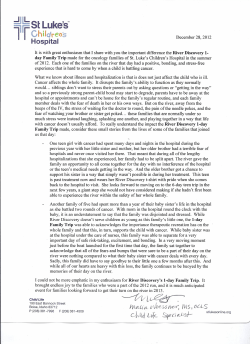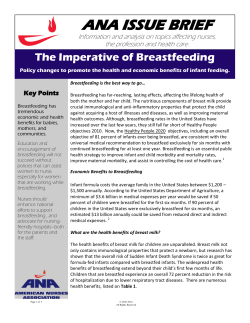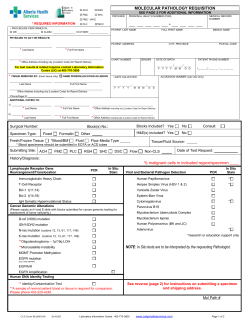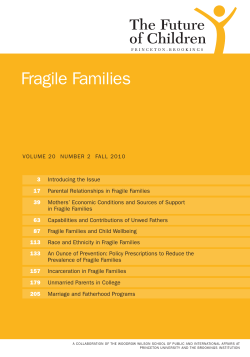
Seeds of Success Seeking solutions for teen mothers
Seeds of Success Seeking solutions for teen mothers and their children Contents Message from the Women’s Leadership Council 1 Who are teen moms? 2 Which teens are most at risk for becoming moms? What are the challenges? 3 Teen Moms and Poverty 4 The Importance of Education / 5 Helping Teen Moms Get an Education 9 Supports in One Place / 9 Education with Child Care / 9 Keeping Teen Moms in High School / 10 Visiting Teen Moms at Home 11 Role Models, Family and Other Social Supports 12 The Grandmother Myth / 12 Other Supports / 12 The Health of Teen Moms: Physical and Mental 6 Housing Teen Moms The Parenting Challenge 7 Supported Living / 13 The Effects on the Kids 7 What can be done? 8 What’s Working? 8 This report was generously sponsored by TransCanada Corporation, in honour of Sarah Raiss and her significant contributions to TransCanada and to the community. 13 Contraception for Teen Moms 14 Who is helping teen moms in Calgary? And what’s missing? 15 Housing / 15 Workplace skills / 17 Education / 18 Social support / 21 Health Care / 22 Conclusion24 The research summarized in this paper reflects peer-reviewed, published literature obtained through searches of academic databases including Sociological Abstracts, Social Work Abstracts, Social Services Abstracts, PubMed, SocINDEX and CINAHL for articles from 2000 to the present. Non-academic findings were obtained through review of provincial legislation and recommendations and telephone interviews with representatives of Calgary organizations serving pregnant and parenting teens who responded to a request for an interview. Message from the Women’s Leadership Council If there’s one thing we know for sure, it’s that women are a powerful force to be reckoned with. We know how to get things done, and we know how to bring others on board to help us do it. It has been in that spirit that United Way has formed the Women’s Leadership Council, an initiative to help women in Calgary realize the power of their donation. We as a Council felt a strong need to choose an area to focus on, where we could truly make a difference. Choosing teen moms as our first focus area was an easy decision—many of us are mothers ourselves, and we quickly felt a connection with the very young women in our city who are struggling to stay afloat and raise their children at the same time. The Council knew that in order to help teen moms, we needed to know more about them. What are they struggling with? What are the barriers to success? Who is helping them, and where is more help needed? What are their dreams and aspirations? What’s possible if we work together? This report is just one aspect of that process, and it will help inform the work of the Women’s Leadership Council going forward. We hope to create real change in the lives of these women and their children, and we are proud of this first step toward that change. By helping teen moms succeed, we also help their children reach their full potential and avoid the cycles of poverty and abuse their mothers may have experienced. We invite you to join us on this important journey to creating change, right here in our city. Peggy Smart 2011 Women’s Leadership Council Co-Chair Jennifer Bidlake Schroeder 2011 Women’s Leadership Council Co-Chair Teenage Mothers | 1 Who are teen moms? United Way is committed to helping children and youth be all that they can be. This means we support young people to be physically and emotionally healthy, to succeed in school and, ultimately, to have the skills and competencies to successfully launch into adulthood. Both teenage mothers and their children face many challenges in achieving these goals. 2 | Teenage Mothers For the purposes of this report, teen moms are young women aged 19 years old or less who are parenting one or more children. The good news is that birth rate among girls and women aged 19 years or less is on a steep decline. In 2007, Calgary’s teen birth rate was 12.8—compared with 20.6 in Alberta and 13.3 in Canada as a whole—down from 19.1 in 1997. There are also few births among teens under the age of 16 years: at the time of delivery, most mothers are 18 or 19 years old. However, because our population is growing, the total number of teen births is slowly rising. More than 500 babies are now born each year to teenaged mothers in Calgary. We don’t know how many of these mothers have additional children while in their teens but, in Canada as a whole in 2003, 15% of teenage mothers had two or more children before the age of 20. The other good news is that poor outcomes are not inevitable for teen moms, and not all teen mothers will experience the challenges outlined in this report. There are excellent supports available in Calgary, and many will raise happy, healthy children. However, we know that parenting is a challenging task that can be much more difficult when you’re a struggling teen. Which teens are most at risk for becoming moms? What are the challenges? Teenage mothers can come from all walks of life, but many of them have serious life challenges in common, including family poverty, family dysfunction, academic problems and high school drop-out, high aggression, favourable views about pregnancy and early parenthood, negative peer associations, and limited economic opportunities. Rates of teen pregnancy are much higher among teenagers in low-income families, with low self-esteem, low expectations for the future, and a history of family dysfunction, poor parenting, or child abuse. Income & Health Like elsewhere in Canada, the vast majority of pregnant and parenting teens in Calgary are living on low incomes, often in precarious housing and family situations. For example, among participants at the Louise Dean School, which serves pregnant and parenting teens, 86% of clients had annual incomes of less than $20,000 and 75% had difficulty meeting basic needs such as food, housing, and child care. At least 40% of these clients were experiencing mental health issues, relationship conflict, and family violence. Homelessness Many pregnant teens in this city are extremely vulnerable. Fifty-two percent of homeless girls and women in Calgary (half of whom were in their teens) reported that they had been pregnant at least once. In 2010, the Alex’s Youth Health Centre alone provided prenatal medical care and other supports to about 40 young women (at least 20 of whom were teenagers) who were homeless or precariously housed and, in many cases, experiencing substance abuse and/or mental health issues, at the time of conception. In about two-thirds of cases, the infants of teen mothers served by the Alex are apprehended at birth or within the child’s first year by child welfare. Aboriginal and Immigrant Teens Consistent with national data, births are higher among Aboriginal teens. They may also be higher among some groups of immigrant teens although, at least in Canada as a whole, immigrant girls and women have a much lower likelihood of becoming teenage mothers than Canadian-born girls and women. Teenage Mothers | 3 Teen Moms and Poverty Teenage mothers are at risk of long-term poverty for three reasons: Ò First, most teenage mothers are lone parents, and single mothers overall are about five times more likely than married mothers to live in low income. Ò Second, single mothers who become mothers in their teens run a higher risk of living in poverty because they are less likely to get married and to stay married than their older counterparts—since they had an early start, they tend to have more children than adult mothers. The younger a woman becomes a parent, the more likely it is that both mother and child will always be poor. Teens who have more than one baby while under the age of 20 may be at highest risk of long-term poverty. Ò Finally, teenage mothers are less likely than other mothers to have completed high school and are more likely to be unemployed. Failure to complete high school can mean a life of hardship for both mothers and children. In today’s economy, high school completion is usually the minimum requirement for entry into the workforce—even a poorly-paid, low-skill job. “It’s stressful because there are a lot of things you have to pay for. You have to pay for rent, all your bills, electricity, clothes, diapers, everything. So you’re pretty much left with nothing.” — Young Mom Focus Group Participant 4 | Teenage Mothers The Importance of Education Not having a high school education contributes to lower earnings, higher risk of job loss, fewer benefits, and lower levels of savings over time. For example, in 2000, 75% of lone mothers who did not complete high school lived in poverty. This is compared with 62% of those who completed high school, 54% of those with non-university post-secondary credentials, and 31% of those with a university degree. When teen mothers complete high school and postsecondary education, their chances of living in poverty become the same as adult single mothers. This is partly because teen mothers with a high school diploma are as likely as adult mothers with the same education to be in full-time employment, and those with a postsecondary degree or certificate are actually more likely to be in full-time employment than their adult counterparts. Teenage Mothers | 5 The Health of Teen Moms: Physical and Mental Pregnancy in adolescence often carries extra health risks for the mother, including anaemia, high blood pressure, preterm birth and, because the mother is often still growing herself, inadequate weight gain, vitamin deficiencies, and Caesarean births. On top of that, most teen births were not planned, so mothers may not have been living healthy lifestyles at the time of pregnancy and many do not seek out prenatal care, especially in the early stages of pregnancy. Girls and women who become mothers in adolescence are also more likely to smoke, be overweight later in life, and suffer from poorer health than women who become mothers in adulthood. Many teenage mothers suffer from post-partum and long-term depression. The strongest predictors of postpartum depression include depression during pregnancy, experiencing stressful life events during pregnancy or shortly after birth, low levels of social support, and a previous history of depression; these are all more common among teenage mothers. Ongoing depression is higher among lone mothers as a whole and higher still among teenage mothers because of factors such as life circumstances. A teen mom’s depression doesn’t just affect her—it also affects her child. Infants of depressed mothers are at risk for developing insecure attachment, emotional, and self-regulation problems; toddlers and preschoolers are at risk for developing poor self-control, internalizing and externalizing problems, and difficulties in cognitive functioning and social interaction; school-age and adolescent children are at risk for problems such as conduct disorders, affective disorders, anxiety disorders, ADHD, and learning disabilities. Both a mother’s depression and a child’s behaviour problems can be intensified by poverty, family conflict, and stressful life events, all of which are more common in families headed by lone teenage mothers. 6 | Teenage Mothers The Parenting Challenge Positive parenting and strong families can buffer many other hardships in a child’s life. “Positive parenting” means expressing love and affection, being a good provider, setting and enforcing rules consistently, offering stimulating experiences, modelling good values, attitudes, and behaviours, establishing positive links with school and community, and following daily routines. Being a good parent is a tough job, and much tougher still if the mother grew up in a dysfunctional family, is isolated and lacks positive role models, is depressed, anxious or physically unwell, is struggling to meet basic needs like food and shelter, and is experiencing the tumultuous physical and emotional changes that are a normal part of adolescence. This means that many teenage mothers are those who are the least equipped for adulthood and parenting and the most likely to repeat the challenges that they experienced in childhood in another generation of vulnerable children. In fact, teen parenting is sometimes associated with child abuse, especially when the mother is aged 17 or younger. The Effects on the Kids Studies show that the key factors that put a child at risk of poor health and development include poverty, lone parenting, teen parenting, low level of parental education, parental substance abuse, parental mental health issues, and negative parenting practices and abuse. Many of these factors occur together, with each of the other risk factors exacerbating negative parenting practices. The more risk factors that children experience, the more likely it is they will experience behavioural and conduct disorders, hyperactivity, poor school performance, emotional problems, and aggression and delinquency. In infancy, early childhood and middle childhood, the children of teenage mothers experience higher rates of developmental problems, learning difficulties, and behavioural problems and, later in life, lower educational aspirations, increased school failure, higher rates of criminality, welfare dependency, and greater likelihood of becoming a teen parent themselves. Teenage Mothers | 7 What can be done? Poor outcomes for teenage mothers and their children are not inevitable. Research clearly shows that with the right supports, teenage mothers can be strong parents and, at the same time, mature into successful adults in their own right. Ò While teen mothers are less likely than adult mothers to complete high school and postsecondary education, when they do achieve these goals their likelihood of living in low income is significantly reduced. Ò Higher levels of education among teenage mothers are linked to safer, more nurturing, and more developmentally-appropriate home environments. Ò Some teenage mothers are motivated by pregnancy to stop unhealthy behaviours, such as using drugs and alcohol, and to plan for their futures. Ò Increased social support can reduce a mother’s depression and improve parenting skills. Ò Comprehensive and long-term parenting programs and interventions, particularly if they support the mother to improve her long-term life plan, can improve teen mothers’ parenting practices and children’s developmental outcomes. What’s Working? There is no single magic bullet to ensure that both teenage mothers and their children will achieve positive developmental outcomes. Research shows that many teenage mothers need a full suite of comprehensive supports over a long period of time to become healthy, happy, and financially-secure adults and to be strong parents so that their children can thrive. Research indicates that the most effective supports for both mothers and children are: Ò Ò Ò Ò Ò 8 | Teenage Mothers Education Help meeting basic needs (including housing) Physical and mental health care Parenting instruction and support Social support Helping Teen Moms Get an Education Comprehensive education and support programs for pregnant and parenting teens are very successful in helping mothers to complete high school and, in many cases, post-secondary education. These programs can improve teen mothers’ income levels, employment, housing, health, parenting skills and child development and, in some cases, even reduce the incidence of second pregnancies. Supports in One Place Comprehensive programs offered in schools or health clinics that provide health care, family planning, counselling, education or support for mothers to continue their education, social support, and parenting education have shown moderate to high success in preventing repeat pregnancies, helping teen mothers continue their education, and improving teen and infant health over 6 to 18 months. The success of these programs may be because of the “one-stop shopping” approach, access to other services, and relationships developed with program staff. It appears that long-term participation, perhaps over a number of years, improves success rates. Education with Child Care Although much of the evidence is anecdotal, high school programs for teenage mothers that include parent support and education components and on-site child care have been effective in keeping the mothers in school until they graduate. These school-based programs are usually multifaceted, offering a wide range of supports such as parenting instruction and support, health care, counselling, transportation, and housing assistance. In addition to improving high school completion rates, these programs can improve a mother’s life course, parenting competence and child development, reduce depression, and, in some cases, reduce second pregnancies. “I just want her (my daughter) to have the best; that’s why I’m in school. If I never had her then I probably wouldn’t have gone back to school or even tried as hard as I am now.” — Young Mom Focus Group Participant Teenage Mothers | 9 Keeping Teen Moms in High School “I’m trying to be healthy and take care of my kid and money and concentrating on school, graduating next year, diplomas… so lots of stress.” — Young Mom Focus Group Participant 10 | Teenage Mothers The research shows that it’s better to engage and support teenagers when they are still pregnant and attending school. In two of the few rigorous evaluations conducted, programs serving teenage mothers who had dropped out of school found that program participants were no more likely than those in the control group to improve their reading and math skills, find and maintain employment or reduce their rates of welfare dependence, or to have fewer second pregnancies. In addition, the programs had no impact on children’s wellbeing. The research indicates that early intervention may be crucial to improving outcomes for teen mothers and their children. Visiting Teen Moms at Home Home visiting is a community-based strategy for delivering services that aims to improve outcomes for high-risk families through education and support. Programs using nurses, social workers or other professional visitors appear to be the most effective. A very intensive, long-term home visitation program, the Nurse-Family Partnership, for high-risk mothers of all ages, has been identified as a best practice in home visitation. Evaluations have consistently found significant and lasting improvements in prenatal health behaviours, parenting, child abuse and neglect, child health and development and, based on 15-year follow-up, improvements in the mother’s life-course and reduced criminal involvement of the mothers and children. Repeated studies have found a lower rate of subsequent pregnancies, welfare, child abuse and neglect, and criminal behaviour among participating mothers. Similar intensive nurse home visitation programs targeting teenage mothers have shown positive impacts on infant health in the first weeks of life. However there are mixed results with respect to parenting practices, school continuation, depression, drug and alcohol use, and delaying or reducing second pregnancies except, perhaps, among teens assessed as having higher levels of intelligence, mental health, and self-confidence. Although most of the research on home visitation is on programs using paid professional staff, some research of programs using lay visitors and volunteers have found them to be successful as well. They saw positive outcomes such as increased use of prenatal care, improved health of pregnant women and their children, and improved mental health. Some studies found that programs using lay visitors produced results similar to those using nurses, social workers or other professional visitors with respect to improved parenting and quality of the home environment. Overall, most evaluations suggest that, at best, many home visitation programs may assist in laying the foundation for healthy child development and may produce modest, short-term benefits for children. However, for more marginalized children and families, lay visitor programs are probably insufficient on their own to offset the severe and multiple risks experienced by the children. Teenage Mothers | 11 Role Models, Family and Other Social Supports Social support has a positive impact on teenage mothers’ psychological state and parenting practices. We know that socially-isolated families benefit from positive social ties and strengthened social support systems, including both informal and community supports. For isolated teenage mothers, good support systems can dramatically reduce depression and improve child outcomes. Research suggests that the links between social support and better parenting include increased parental self-confidence. The Grandmother Myth Research shows no difference in the impact of social support received through a network and that received from extended family (such as the teenage mother’s parents). The common assumption that teenage mothers should live with their own parents and that the mother’s mother (the child’s grandmother) is the best source of parenting support may not be universally true. Several studies support this belief, but others have found that living with the grandmother sometimes has adverse effects, such as increasing the mother’s level of stress, increasing negative parenting behaviours by both the mother and the grandmother, decreasing the mother’s sense of independence and parenting competence, and negatively influencing child functioning. Overall, whether or not support from grandmothers is positive or negative depends on the grandmother’s parenting skills and the nature and quality of the relationship between mother and grandmother. Therefore, it should not be assumed that all grandmothers are optimal, or even good, sources of support for teenage mothers. Other Supports Beyond the extended family, it is not clear which types of organized social support interventions for teenage mothers are effective. However, it appears that relationships that involve give and take between both parties in the relationship, are long-term, and begin before or immediately following birth may be most helpful to teen mothers. “You have to try and surround yourself with really good friends that can support you in place of your family. They can be your family. For me a lot of my friends have become my family.” — Young Mom Focus Group Participant 12 | Teenage Mothers Housing Teen Moms Many teenage mothers cannot or do not want to live with their own parents due to financial difficulties, crowding, previous abuse, or their parents’ unwillingness to have them. Some teenage mothers have been in the foster care system for some time and can’t return home. In addition to the obvious challenge of finding safe and affordable housing, some landlords will not rent to minors. Finally, teenage mothers face challenges in obtaining social assistance benefits in Alberta. Supported Living While some teenage mothers may be capable of living on their own with perhaps some external supports, many require a more supported living environment, such as a maternity home, in order to manage and care for their children. Modern maternity homes generally accept residents during pregnancy and immediately after the birth of the child. They teach teenage mothers independent living and parenting skills, foster attachment between mother and baby, and address mothers’ physical and emotional needs. After a period of time, often when the infant is six months old, the mother is transitioned into longerterm, independent housing. It appears that different housing options for teenage mothers and their children have not been subject to rigorous evaluation. We do know however, that outcomes are better if teenage mothers are securely housed and provided with additional supports. Teenage Mothers | 13 Contraception for Teen Moms Research about risk factors for second pregnancies in teenage mothers has produced unclear and contradictory findings. For example, some research reveals that teens with subsequent pregnancies have the same risk factors as teens who are pregnant for the first time; other research shows that teen mothers with many risk factors do not have a second pregnancy. Some studies show that poor first pregnancy outcomes are associated with second pregnancies; others show that good parenting experiences are associated with second pregnancies. It is not clear that any particular program, even those which are very comprehensive, is effective in preventing second pregnancies to teenage mothers. Other than initiatives that encourage teens to use a contraceptive implant, programs don’t appear to have any real impact. That being said, some research suggests that preventing additional births might be increased by 1) engaging the teen in comprehensive programming when she is pregnant for the first time and continuing involvement until the child is at least two years old and the mother is at least 18, and 2) providing a great deal of support and information about family planning and contraception. 14 | Teenage Mothers Who is helping teen moms in Calgary? And what’s missing? We know that housing, health, education, workplace skills and socials supports are all critical to the success of teen moms and their children. The following is a summary of the services provided in Calgary in these areas, as well as where there may be gaps or opportunities. Housing Calgary has three short-term housing facilities for pregnant and parenting girls and young women, with a collective capacity to serve 18 mothers and their children at one time. All of the housing programs provide life skills and some form of parent training and other supports, with the most intensive skills training and supports provided at Emma House and Elizabeth House. Ò Emma House is a Christian-based facility funded through community and church donations for girls and women at risk of homelessness and/or having abortions. Women typically arrive when they are between three and six months pregnant and are able to stay until six months after the baby’s birth. Emma House can accommodate up to three women and their infants at one time. The vast majority of clients served at Emma House are under the age of 20 years. Ò Elizabeth House is a Christian-based program funded by Catholic Charities, although residents need not be Catholic. Women can stay for the duration of the pregnancy and up to four months after the baby’s birth. Elizabeth House can accommodate up to seven mothers and infants at one time. About 95% of residents are teenagers. Teenage Mothers | 15 Ò The Highbanks Society is a secular program funded by community members, casinos and, until 2012, an anonymous donor. This program is for young mothers who are attending school or a vocational training program. Highbanks provides eight subsidized units in apartment buildings for mothers and their children, many of whom stay with the program for two years or more. Relative to the residents at the other two housing programs, Highbanks residents are lower risk. Although the program accepts girls and women aged 16 to 24 years, most of the mothers are aged 18 to 20, none experience addictions or mental health issues, and few or none have been on the streets. Although many have been wards of the government themselves, none or almost none are involved with child welfare with respect to their babies. Almost all participants do complete high school and about one-third go on to post-secondary education. What’s Missing? It is difficult for teenage mothers to find affordable places to live and harder still to secure one of the 18 available spaces provided by the three short-term housing facilities. Ideally, teenage mothers would receive extensive support and assistance from their own highly-functional parents and extended families. But poverty and family dysfunction are common among the families of pregnant and parenting teens. Even if the parents of the teenage mother are willing to help— and many are not—they may not have the housing space, financial resources or personal capacity to do so. In addition to finding appropriate housing, many teenage mothers cannot pay for housing because they aren’t working and they are often not eligible for social assistance. Provincial policy and legislation presume that families can and should support teenage mothers. The Alberta Income Support, Training and Health Benefit Regulation specifies that 16 and 17 year olds are eligible for income support only if they are married to an adult, living with an adult in a relationship approved by their parents, their parents are unable or unwilling to support them, and the household is eligible for assistance. All other 16 or 17 year olds, including those separated from their spouse or partner, are referred to Children and Youth Services for investigation and follow up if their parents are unable or unwilling to support them. There appear to be no provisions for teenage single parents, as they are expected to apply for education benefits and attend school. 16 | Teenage Mothers Workplace skills Discovering Your Opportunities is a six-week summer program for pregnant and parenting teens provided by The City of Calgary Youth Employment Centre, Catholic Family Services, and the Louise Dean Centre. The program can accommodate about 13 participants who are paid to attend the program, for which they earn high school credits, develop a career and life plan, and gain work experience. In 2010, nine of the 13 participants completed the program and received positive evaluations from their work placement employers. The Commitment Coaches program was developed as an extension of Discovering Your Opportunities, in an effort to provide mentors and intensive one-on-one support to teen moms who were not accepted into the program, as well as other young mothers. United Way is funding this program as a one-year demonstration project. What’s Missing? The longer-term impacts of Discovering Your Opportunities have not been evaluated, but there is considerable research indicating that work experience programs can be very helpful to youth in general in broadening their awareness of the range of career options available to them, strengthening workplace skills, and improving employment prospects. Clearly, more than 13 teenage mothers would benefit from the opportunity to participate in these sorts of programs, but more resources are needed to expand the program and pay for the teens’ stipends and program costs. Teenage Mothers | 17 Education The Calgary Board of Education, Catholic Family Services, and Alberta Health Services collectively provide the Louise Dean Centre, a comprehensive, full service program for pregnant and parenting girls and women aged 14 to 24. The Centre includes a school for pregnant and parenting teens up to age 19 that provides a full academic program with integrated prenatal, parenting, and life skills classes, and a low-cost breakfast and lunch program for students. The Centre has a nurse on staff, provides weekly visits from a physician, and provides dental and psychological services as required. Some participants are referred out for pre- and post-natal care, often to the Alex Youth Health Centre. The Louise Dean Centre also provides additional supports such as counselling, help in securing housing, employment preparation, and life skills training. Also provided on site is a child care facility for the infants of the most at-risk mothers, which also works with the mothers to improve their parenting skills. The child care facility can accommodate only 35 children, meaning that many Louise Dean participants have to find alternate child care arrangements. For participants who have completed school or otherwise left the Louise Dean Centre, or who choose not to participate in the Centre, outreach services for pregnant and parenting mothers aged 16 to 24 are available through Catholic Family Services. Outreach services can include parent education programming, inhome counselling supports, and direct and facilitated referrals to other programs. An additional component of outreach services is the Calgary Achievement Centre for Youth (CACY), which offers on-site childcare, parenting programs, and specialized health services for infants to young parents who are attending alternative high school and employment programs at CACY. The Calgary Separate School District (the Catholic school board) also provides a resource centre for pregnant and parenting teens (both male and female) who are students and continue to attend their home school. 18 | Teenage Mothers What’s Missing? The research is clear that most teenage mothers require long-term, comprehensive support to become strong parents and to mature into happy, healthy, productive adults. While health, education, social and parenting programs and supports are important on their own, they are most effective and, for many teenage mothers, only effective, when they are provided as a package. This is not to say that all supports must or even should be provided by a single service provider but, somehow, services need to “wrap around” the mother. Existing programs and services do not always have the resources to provide the types and quantity of supports required by teenage mothers. For example, the child care program at Louise Dean Centre can no longer accommodate all the children of participants and therefore accepts only the infants of the most at-risk mothers and only for a period of months. Research indicates that most children of teen mothers would benefit from this sort of child care, and that years, not months, of engagement are required to have significant positive impacts on child development. “It’s hard for me because I started school in April and I couldn’t get student financing because they said they only do some financing in September and February. I have to live off Social Assistance. It gets hard because I have to support my child with diapers, I have to buy him clothes. It seems like every two weeks he just grows and grows.” — Young Mom Focus Group Participant Teenage Mothers | 19 The Alberta Income Support, Training and Health Benefit Regulation specifies that 16 and 17 year-olds are eligible for benefits only if they (i) live with an adult partner (or their parents/guardians, who are receiving benefits), (ii) are an apprentice “full-time learner” or an EI-funded learner (in an approved training program), or (iii) if they are “determined to be an adult member in accordance with requirements specified by the Director.” This means that some teenage mothers are not eligible for “learner” benefits— social assistance in order to attend school—available through Alberta Works. These benefits are not intended for people attending the regular K–12 school system; to be eligible, the individual must have not attended school for 12 months and be an adult. The age and out-of-school requirements may be waived for: 20 | Teenage Mothers Ò A single parent who is aged 18 or 19 years and attending high school and not living with his or her own parents or living with his or her parents or in a household already in receipt of income support. Ò A youth who is aged 16 or 17 years and (i) lives with an adult spouse or partner; (ii) if child welfare determines that he or she is capable of living independently and that, due to irreconcilable family breakdown, he or she needs to live independently; or (iii) if the youth is a single parent and is the legal guardian of the child and lives with his or her own parents: “A 16 or 17 year old single parent (with their child/ren) is encouraged to reside within the family unit in order to continue to receive emotional and social support.” The policy does not explicitly state that conditions (i) or (ii) might apply to a 16 or 17 year old single parent. Ò There is no provision in the regulations for single parents under the age of 16. Social support The Teen Parent Friend Program, offered by Catholic Family Services, matches pregnant and parenting girls and women up to age 24 with volunteer lay mentors, who spend at least one hour per week together for at least six months. The goal is to improve mothers’ life and parenting skills, help them access community and government services, and reduce their isolation. Almost all of the mothers are unemployed, with social assistance and/or family as their source of income. Most struggle to meet basic needs and many are socially isolated. About one-third live with their own parents. The program serves a high number of women who were not born in Canada. Most of the mothers are also involved with other programs, such as Louise Dean School or one of the housing programs. Types of home visitation services are provided by several organizations in Calgary in addition to Catholic Family Services, such as Closer To Home (6–8 weeks for families in crisis) and McMan Youth, Family & Community Services. Some services are also available under certain circumstances through Alberta Health Services. What’s Missing? The Teen Parent Friend Program appears to be the only program specifically targeting teenage mothers. Also, program staff report that they have difficulty recruiting and retaining volunteers. There appear to be no intensive, long-term home visitation programs staffed by professionals that could accommodate many of Calgary’s teenage mothers. Teenage Mothers | 21 Health Care “The Alex has a youth centre and then they have an adult centre and then they have the clinic and I walk in there and I talk to my doctor. I get my birth control there for free to avoid the risk of getting pregnant again.” — Young Mom Focus Group Participant 22 | Teenage Mothers Ò The Alex Youth Health Centre, a program of the Alexandra Community Health Centre, provides a wide range of comprehensive physical health, mental health, and social services to youth aged 12 to 24 who are homeless or at risk of homelessness. In response to increased demand, the Centre has increased its pre- and post-natal medical services. Physicians, residents, and nurses are available five days a week and the Centre also provides on-site lab services and a breastfeeding clinic, along with a weekly, drop-in parenting support group and a Healthy Babies program. At present, the Centre is providing prenatal services to about 40 youth, about half of whom are teenagers and about one-third of whom are Aboriginal. The Centre tries to assist all mothers-to-be to secure housing and often refers clients to Emma House and Elizabeth House. Client data from the past few years indicate that about one-third of the infants born to their clients are apprehended at birth by child welfare, about one-third are apprehended sometime within their first year of life, and about one-third remain with their mothers. Ò Free or low-cost birth control is available at any of the four Alberta Health Services Sexual and Reproductive Health Clinics in Calgary. What’s missing? Many pregnant and parenting teens are not taking advantage of the health care services provided by the Alex and other health practitioners and programs. Many teenage mothers require long-term, intensive counselling services, which can be difficult to access due to cost (although many organizations offer counselling on a sliding fee scale), office hours, office location and transportation challenges, and child care challenges. Finally, not all pregnant teens or teenage mothers are eligible to obtain extended no-cost health benefits. The Alberta Income Support, Training and Health Benefit Regulation specifies that dependent youth aged 16 or 17 years are eligible for health benefits as part of a household that receives social assistance or meets the low-income requirement, and adult pregnant women who do not normally receive social assistance but meet the government’s low-income requirement are eligible for health benefits until the end of the month of the woman’s expected delivery date. The eligibility of youth under the age of 18 who are living independently and who do not have child welfare status is unclear. There appears to be no specific provision in the policy for pregnant girls under the age of 18 years or their children. Teenage Mothers | 23 Conclusion The good news is that birth rate among teen girls is declining, and research shows that there are supports and resources for both teen mothers and children that help them reach their full potential and be all that they can be. There are many effective housing, education, workplace skills and social support programs in Calgary that help these young families. However, more than 500 babies are born to teen moms in Calgary each year, and there is still much that can be done to make sure that both mothers and children thrive. United Way and the Women’s Leadership Council are developing an action plan to address what extra support teen moms in Calgary require in the short and long term. Considerations might include: Ò Challenging the assumption that the families of teen moms are always in a position to support their daughters and grandchildren, and they are the best source of support. Provincial policy and legislation currently reflects this assumption. Ò Acknowledging the intensity of help that is required to make a difference for teenage mothers and their children. Teenage moms often require long-term, comprehensive support to become strong parents. Existing programs and services do not always have the resources to provide this level of care. Ò Working to improve data collection to better assess the type and nature of services required to support teenage mothers in Calgary. Currently, there is no way to follow individual girls across programs to identify how many and which teen mothers obtained which services. Ò Creating strategies to meet teen mothers’ basic needs—i.e., diapers, food, transportation, etc.—and engage women to collect items for these moms and their babies. Ò Encouraging women in Calgary to volunteer their time to help teen moms, whether through collections, mentorship, or other opportunities. Ò Exploring the systems and policies that create barriers for teen moms to live in safe housing, get an education and receive income benefits. We believe that all children are born with the potential for healthy, happy, productive lives. Supporting teen moms not only helps them have a more successful future, but also helps their children to achieve the same. 24 | Teenage Mothers Thanks to Merrill Cooper of Guyn Cooper Research Associates Ltd. for her work on this report. Thank you also to the community agencies who gave additional information. For the full bibliography, please contact United Way of Calgary and Area. Teenage Mothers | 25 United Way of Calgary and Area P: 403.231.6265 600, 1202 Centre Street SE Calgary, AB T2G 5A5 CALGARY F: 403.355.3135 http://www.facebook.com/calgaryunitedway E: uway@calgaryunitedway.org http://twitter.com/unitedwaycgy United Way is a registered charity. Business Number 13022 9750 RR0001 www.calgaryunitedway.org www.calgarysocialvoice.com
© Copyright 2025
